Late capitalism is a concept first used in print by German economist Werner Sombart at the start of the 20th century. In the late 2010s, the term began to be used in the United States and Canada to refer to corporate capitalism.
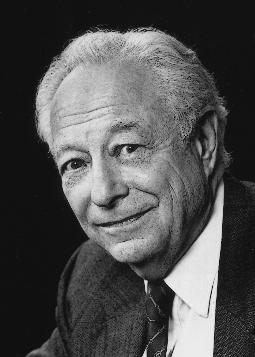
Irving William Kristol was an American journalist who was dubbed the "godfather of neoconservatism". As a founder, editor, and contributor to various magazines, he played an influential role in the intellectual and political culture of the latter half of the twentieth century. After his death, he was described by The Daily Telegraph as being "perhaps the most consequential public intellectual of the latter half of the century".

Fredric Jameson is an American literary critic, philosopher and Marxist political theorist. He is best known for his analysis of contemporary cultural trends, particularly his analysis of postmodernity and capitalism. Jameson's best-known books include Postmodernism, or, The Cultural Logic of Late Capitalism (1991) and The Political Unconscious (1981).

Henryk Grossman was a Polish economist, historian, and Marxist revolutionary active in both Poland and Germany.
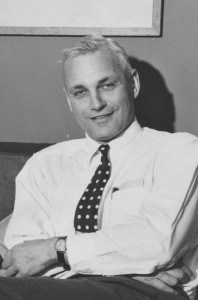
Paul Marlor Sweezy was a Marxist economist, political activist, publisher, and founding editor of the long-running magazine Monthly Review. He is best remembered for his contributions to economic theory as one of the leading Marxian economists of the second half of the 20th century.

Adelphi University is a private university in Garden City, New York. Adelphi also has centers in Downtown Brooklyn, Hudson Valley, and Suffolk County in addition to a virtual, online campus for remote students. It is the oldest institution of higher education in suburban Long Island. As of 2019 it has about 7,859 undergraduate and graduate students.

Paul Mattick Sr. was a German-American Marxist political writer and social revolutionary, whose thought can be placed within the council communist and left communist traditions.
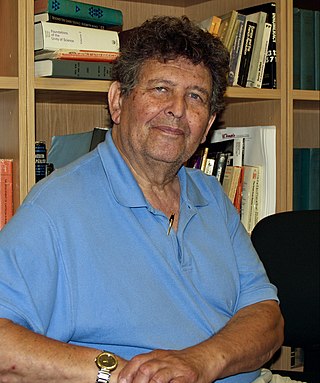
Stanley Aronowitz was an American sociologist, trade union official, and political activist. A professor of sociology, cultural studies, and urban education at the CUNY Graduate Center, his longtime political activism and cultural criticism was influential in the New Left movement of the 1960s, 1970s, and beyond. He was also an advocate for organized labor and a member of the interim consultative committee of the International Organization for a Participatory Society. In 2012, Aronowitz was awarded the Center for Study of Working Class Life's Lifetime Achievement Award at Stony Brook University.
Marxism is a political philosophy and method of socioeconomic analysis. It uses a materialist interpretation of historical development, better known as "historical materialism," to understand class relations and social conflict. It also uses a dialectical perspective to view social transformation. Marxism originates from the works of 19th-century German philosophers Karl Marx and Friedrich Engels. Marxism has developed over time into various branches and schools of thought, As a result, there is no single, definitive Marxist theory. Marxism has had a profound impact in shaping the modern world, with various left-wing and far-left political movements taking inspiration from it in varying local contexts.

Nancy Fraser is an American philosopher, critical theorist, feminist, and the Henry A. and Louise Loeb Professor of Political and Social Science and professor of philosophy at The New School in New York City. Widely known for her critique of identity politics and her philosophical work on the concept of justice, Fraser is also a staunch critic of contemporary liberal feminism and its abandonment of social justice issues. Fraser holds honorary doctoral degrees from four universities in three countries, and won the 2010 Alfred Schutz Prize in Social Philosophy from the American Philosophical Association. She was President of the American Philosophical Association Eastern Division for the 2017–2018 term.

John Bellamy Foster is an American professor of sociology at the University of Oregon and editor of the Monthly Review. He writes about political economy of capitalism and economic crisis, ecology and ecological crisis, and Marxist theory. He has given numerous interviews, talks, and invited lectures, as well as written invited commentary, articles, and books on the subject.
Peter Joseph Boettke is an American economist of the Austrian School. He is currently a professor of economics and philosophy at George Mason University; the BB&T Professor for the Study of Capitalism, vice president for research, and director of the F.A. Hayek Program for Advanced Study in Philosophy, Politics, and Economics at the Mercatus Center at GMU.
Criticism of Marxism has come from various political ideologies, campaigns and academic disciplines. This includes general intellectual criticism about dogmatism, a lack of internal consistency, criticism related to materialism, arguments that Marxism is a type of historical determinism or that it necessitates a suppression of individual rights, issues with the implementation of communism and economic issues such as the distortion or absence of price signals and reduced incentives. In addition, empirical and epistemological problems are frequently identified.
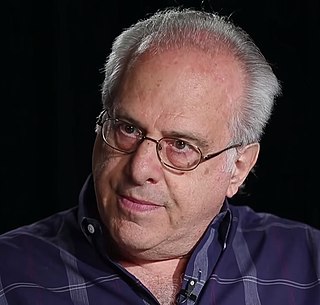
Richard David Wolff is an American Marxian economist known for his work on economic methodology and class analysis. He is a professor emeritus of economics at the University of Massachusetts Amherst and a visiting professor in the graduate program in international affairs of the New School. Wolff has also taught economics at Yale University, City University of New York, University of Utah, University of Paris I (Sorbonne), and The Brecht Forum in New York City.
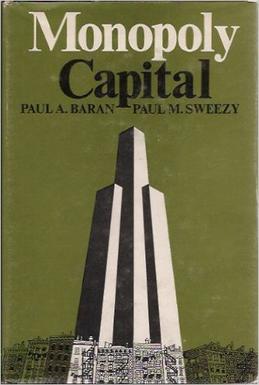
Monopoly Capital: An Essay on the American Economic and Social Order is a 1966 book by the Marxian economists Paul Sweezy and Paul A. Baran. It was published by Monthly Review Press. It made a major contribution to Marxian theory by shifting attention from the assumption of a competitive economy to the monopolistic economy associated with the giant corporations that dominate the modern accumulation process. Their work played a leading role in the intellectual development of the New Left in the 1960s and 1970s. As a review in the American Economic Review stated, it represented "the first serious attempt to extend Marx’s model of competitive capitalism to the new conditions of monopoly capitalism." It attracted renewed attention following the Great Recession.
Critique of political economy or simply the first critique of economy is a form of social critique that rejects the conventional ways of distributing resources. The critique also rejects what its advocates believe are unrealistic axioms, faulty historical assumptions, and taking conventional economic mechanisms as a given or as transhistorical. The critique asserts the conventional economy is merely one of many types of historically specific ways to distribute resources, which emerged along with modernity.
Marxism is a method of socioeconomic analysis that originates in the works of 19th century German philosophers Karl Marx and Friedrich Engels. Marxism analyzes and critiques the development of class society and especially of capitalism as well as the role of class struggles in systemic, economic, social and political change. It frames capitalism through a paradigm of exploitation and analyzes class relations and social conflict using a materialist interpretation of historical development – materialist in the sense that the politics and ideas of an epoch are determined by the way in which material production is carried on.

Herbert Marcuse was a German-American philosopher, social critic, and political theorist, associated with the Frankfurt School of critical theory. Born in Berlin, Marcuse studied at the Humboldt University of Berlin and then at Freiburg, where he received his PhD. He was a prominent figure in the Frankfurt-based Institute for Social Research – what later became known as the Frankfurt School. In his written works, he criticized capitalism, modern technology, Soviet Communism, and popular culture, arguing that they represent new forms of social control.
Various Marxist authors have focused on Marx's method of analysis and presentation as key factors both in understanding the range and incisiveness of Karl Marx's writing in general, his critique of political economy, as well as Grundrisse andDas Kapital in particular. One of the clearest and most instructive examples of this is his discussion of the value-form, which acts as a primary guide or key to understanding the logical argument as it develops throughout the volumes of Das Kapital.
Crisis theory, concerning the causes and consequences of the tendency for the rate of profit to fall in a capitalist system, is associated with Marxian critique of political economy, and was further popularised through Marxist economics.











